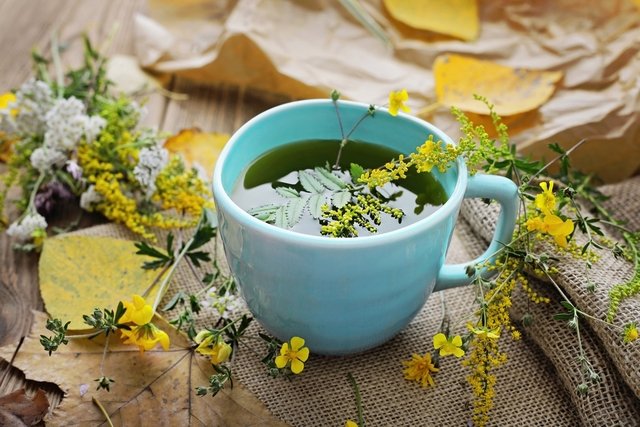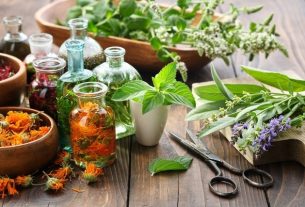Some home remedies that help treat gastroesophageal reflux include chamomile tea, aloe vera juice, licorice tea, potato juice, and anise tea.
These home remedies relieve reflux symptoms by having anti-inflammatory, digestive and antacid effects. However, these remedies should not replace medical recommendations, and it is ideal to use them to complement the treatment prescribed by the doctor.
Gastroesophageal reflux occurs when the contents of the stomach return to the esophagus, causing inflammation and causing symptoms such as heartburn, burning and a lump in the throat. Learn more about gastroesophageal reflux.

Home remedies for gastroesophageal reflux
Some home and natural remedies that help treat reflux are:
1. Chamomile tea
Chamomile tea combats reflux because it has a digestive and anti-inflammatory action, which helps control the production of acids in the stomach, helping to alleviate symptoms such as poor digestion, heartburn and nausea. See other benefits of chamomile tea.
Ingredients:
- 1 tablespoon of dried chamomile flowers;
- 1 cup (tea) of water.
Preparation mode:
Boil the water in a pan and, after turning off the heat, add the chamomile flowers. Cover the pan and let it rest for 5 minutes. Strain and drink up to 4 cups of this tea per day.
Care: This tea is not recommended for people allergic to chamomile and plants from the same chamomile family, such as daisy, ragweed and chrysanthemums. This tea is also not recommended for babies under 6 months.
Tea with simple chamomile (Matricaria recutita) can be used during pregnancy and breastfeeding. Roman chamomile tea should be avoided, as there are still no studies that prove the safety of using this type of plant in these conditions.
2. Espinheira-santa tea
Espinheira-santa is a plant rich in epigallocatechin and arabinogalactan, bioactive compounds that have anti-inflammatory and gastric protective effects. Thus, espinheira-santa tea helps combat reflux symptoms, such as poor digestion and heartburn.
Ingredients:
- 1 teaspoon of dried espinheira-santa leaves;
- 1 cup (tea) of water.
Preparation mode:
Boil water in a pan or kettle. When turning off the fire, put the water in a cup and add the espinheira-santa leaves. Cover the cup and let it rest for 5 to 10 minutes. Strain up to 3 cups of this tea per day, 30 minutes before meals.
Care: This tea should not be used during pregnancy, as it can cause uterine contractions and miscarriage, and it should also not be used by breastfeeding women, as it can reduce the amount of breast milk.
Furthermore, this tea should also be avoided by children under 12 years of age or people with a known allergy to espinheira-santa.
3. Potato juice
Potato juice neutralizes stomach acidity and is recommended to relieve reflux symptoms, such as heartburn, burning sensation and a lump in the throat. Check out all the benefits of potato juice.
Ingredients:
- 1 raw English potato;
- 200 ml of water.
Preparation mode:
Peel the potato and place in a blender or processor, and blend. Add water and mix well. Then strain and drink the unsweetened juice. This juice can be consumed once a day and preferably 30 minutes before any meal.
Care: Potatoes can increase blood glucose levels, especially in people who have diabetes. Therefore, this juice should be used in moderation by people with diabetes.
4. Ginger tea
Ginger tea, when consumed in small quantities, helps combat reflux symptoms because it has antiemetic and anti-inflammatory effects, preventing the return of stomach acid to the esophagus and relieving symptoms such as nausea and poor digestion.
Ingredients:
- 2 to 3 cm of grated fresh ginger;
- 1 cup (tea) of water.
Preparation mode:
Place the ingredients in a pan and let it boil for about 8 to 10 minutes. Turn off the heat, cover the pan and when it is warm, strain and then drink. You can take 1 cup of this per day.
Care: This tea is contraindicated for children under 6 years of age, people with gallstones, stomach irritation or high blood pressure. Likewise, it should not be consumed by people with bleeding diseases or who use anticoagulant medications.
Pregnant women or people taking medication to control high blood pressure or diabetes should only consume ginger tea under the guidance of a doctor.
5. Baking soda
Sodium bicarbonate has an antacid effect, neutralizing stomach acid and temporarily relieving reflux symptoms, such as discomfort, poor digestion, heartburn or burning.
Ingredients:
- 1 teaspoon of baking soda powder;
- 250 ml of filtered or boiled water.
Preparation mode:
Dissolve the sodium bicarbonate well in the water, using a spoon, and then drink. You can drink up to 3 glasses of this mixture of bicarbonate and water per day for up to 2 weeks, as excessive use can worsen the symptoms of heartburn and burning in the stomach.
Care: ingestion of sodium bicarbonate is not recommended for people with alkalosis or hypocalcemia, children under 2 years of age, people allergic to this substance or pregnant or breastfeeding women.
6. Licorice tea
Licorice is a medicinal plant that contains carbenoxolone, which is a substance widely used in the treatment of gastric ulcers, because it helps protect the stomach. Discover all the properties of licorice.
Ingredients:
- 5 g of licorice root;
- 500 ml of water.
Preparation mode:
In a pan, place the licorice root and water and bring to a boil for 10 minutes. Wait for it to cool, strain and drink up to 2 cups of this tea per day.
Care: This tea is contraindicated for people with high blood pressure, heart problems, kidney disease and low blood potassium levels. Additionally, licorice tea should also be avoided during pregnancy and breastfeeding.
7. Aloe vera juice
Aloe vera juice has digestive and anti-inflammatory properties that stimulate digestion and neutralize stomach acids, helping to treat reflux and gastritis. Check out more health benefits of aloe vera.
Ingredients:
- 1 aloe leaf;
- 1 liter of filtered or boiled water.
Preparation mode:
Wash and dry the aloe leaf well. Then, cut the base of the leaf and let the plant rest in a vertical position so that the latex, which is the yellow and toxic part present in the leaf, drains away.
Cut the side parts of the sheet lengthwise. Lay the leaf down and carefully lift the skin on one side, to avoid contaminating the gel with the latex that may still be present in the plant. To remove the gel from the leaf, you can use a non-sharp object, such as a spoon, discarding any green or yellow part that is present in the gel. Then, add the aloe vera gel to the blender, in a proportion of 100 g of gel to 1 liter of water. Blend in a blender and drink up to 3 glasses of this juice per day.
Care: This juice is contraindicated for children, pregnant or breastfeeding women. It is also not recommended for people with uterine or ovarian inflammation, hemorrhoids, anal fissures, bladder stones, kidney failure, appendicitis, prostatitis, cystitis, dysentery or nephritis.
8. Fennel tea
Fennel tea helps to alleviate symptoms of reflux and gastritis, because it contains malic acid, an aromatic compound with powerful antacid, anti-inflammatory and digestive action, which reduces acidity, improves digestion and combats nausea and poor digestion.
Ingredients:
- 1 teaspoon of dried fennel seeds;
- 1 cup (tea) of water.
Preparation mode:
Mash or crush the fennel seeds. In a pan, add water and bring to a boil. After turning off the heat, add the fennel seeds, cover the pan and let it rest for 10 minutes. Strain the drink and drink up to 3 cups of this tea per day, for up to 2 weeks in a row.
Care: This tea is not recommended for children under 12 years of age or people allergic to anise or the compound anethole. Just as this tea is also contraindicated for pregnant or breastfeeding women, people with hyperestrogenism, women with breast cancer who take hormone replacement therapy or people who use anticoagulant medications.
Other tips for treating reflux
Other important tips for treating reflux are:
- Avoid drinking liquids during meals;
- Chew food well and slowly;
- Wear loose-fitting clothes that do not tighten at the waist;
- Eat small meals, especially at dinner;
- Eat your last meal no more than 2 hours before bed;
- Avoid liquid meals at dinner, such as soups or broths.
Furthermore, it is also recommended to sleep at a 45-degree angle, placing a pillow or elevating the head of the bed, as this helps reduce reflux during the night.
See the video below for other tips that help treat reflux:

Sign up for our newsletter and stay up to date with exclusive news
that can transform your routine!
Warning: Undefined array key "title" in /home/storelat/public_html/wp-content/plugins/link-whisper-premium/templates/frontend/related-posts.php on line 12
Warning: Undefined array key "title_tag" in /home/storelat/public_html/wp-content/plugins/link-whisper-premium/templates/frontend/related-posts.php on line 13



